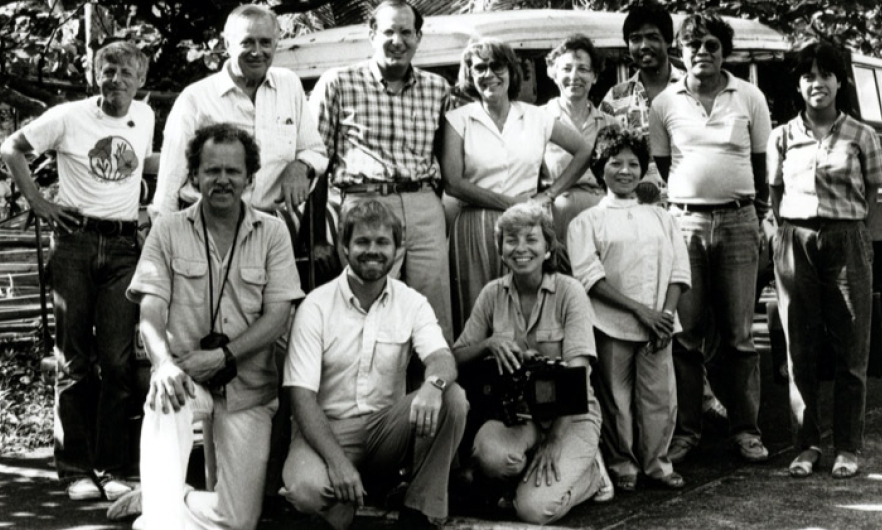How Broadcaster Hugh Downs Helped to Change the Course of JHSPH

Hugh Downs and Al Sommer pose with the production crew from “20/20” in the Philippines while filming a 1986 segment featuring Sommer's vitamin A research.
First, in 1986, he spent a week walking around a village in the Philippines with Al Sommer, presently Dean Emeritus, giving vitamin A capsules to malnourished children and seeing their night vision return within days. He told that story on ABC’s 20/20 in a way that got an entire nation of scientists and generalists to see public health, and the role of nutrition, in a whole new light.
Then, in 1992, he served as the master of ceremonies at the then-Johns Hopkins School of Hygiene and Public Health’s 75th anniversary celebration, telling the story of its history and accomplishments in a way that got an entire room of trustees, celebrities, donors, and peers to understand the School in a whole new way.
Hugh Downs, who passed away on July 1 at the age of 99, was to Americans one of the most well known and trusted voices and faces on television, having co-hosted 20/20 and NBC’s Today show, in addition to appearing on NBC’s The Tonight Show, several PBS series and more. He was also involved with UNICEF, as a member of its Board of Directors and chair of its U.S. National Committee. It was that work and his interest in science that led him to the story of Sommer’s lifesaving vitamin A work.
Sommer, MD, MHS ’73, who at the time was a professor at the Johns Hopkins School of Medicine, remembers the day he got the call. “He said, ‘Al, this is Hugh Downs. Next week, we are going to the Philippines to do a story on your vitamin A work,’” Sommer recalls. An ophthalmologist, Sommer had surgeries planned but said that Downs insisted: “‘If you don’t come, we’re not going.’” They then spent the better part of a week together in the Philippines seeing Sommer’s vitamin A work in the field.
As part of the segment, Sommer said it was Downs’ idea to throw a ball to a boy who could not see at night, give him the vitamin A capsule that would restore his night vision, and to come back a few days later to see if it indeed had. “He was so warm and supportive and looking to demonstrate visually exactly what we were accomplishing,” Sommer said. In the segment, the boy could not see or catch the ball on the first day, but when they returned, he could.
Keith West, DrPH ’86, MPH ’79, RD, George G. Graham Professor of Infant and Child Nutrition in the Department of International Health, who was a partner on Sommer’s research, recalls watching the episode air for the first time while he attended a conference on retinoids with 50 basic scientists. “When Al looked Hugh Downs in the eye and said ‘We just reduced this child’s risk of dying twentyfold,’ it was like Cal Ripken hit a grand slam homer.” West said the scientists around him were wowed into an uproar.
“By the end of 20/20, people were talking about this at a level they had not been talking about this before,” West said. “Hugh Downs had taken this story to the world stage. While these basic scientists are not quite a cross section of America, they are nonetheless the core of the scientific base for what we do in public health. They got excited so it was clear this was going to be a story that would carry.”
It carried even for Downs himself. He broadcast the piece again during the 20/20 20th anniversary show and highlighted it as one of his “most rewarding” assignments on his sign-off show.
He also wanted to remain helpful to the work. So when Sommer called a few years later, after he became dean of the Johns Hopkins School of Hygiene and Public Health, to ask if he might be willing to participate in the School’s 75th anniversary celebration, Downs readily agreed.
He ultimately emceed the event and took the time to write and deliver remarks about the School’s history and accomplishments that kept the influential audience—which included Sir John Wilson, the director generals of both UNICEF and WHO, the current U.S. Secretary of Health and Human Services and U.S. Surgeon General, Ms. Saigon Broadway star Lea Salonga, the Capitol Steps, and other dignitaries—captive.
“Everyone here has contributed in some way to the health and well-being of fellow humans,” Downs said, as he spoke, in his characteristic style, about the crowd of health leaders, researchers, and School alumni.
“He just got himself totally wrapped into it,” Sommer said. “He was willing to put in the time and effort to get this right.”
Sommer says that evening, with Downs at the helm, changed the external positioning of the School and directly inspired new funding. Downs also co-signed the International Declaration of Health Rights that was created for the occasion.
“This was characteristic of him for all of his shows,” West said. “He educated our generation on current issues. These were shows that were deep, insightful, researched, and overlaid with a journalist who had earned the trust of an entire generation. Any message coming from Hugh Downs was taken with a strong sense of trust.”
“We were very lucky that he caught on to us,” Sommer said.
Related
The Story of Dean Sommer and Vitamin A
Vitamin A(Global Health Now)
